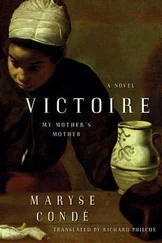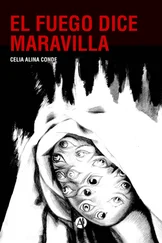For the second time in a few months Hakim set foot inside the church. Because of Charlotte. He had met her one day, escorted by her askari, while she was shopping at the SOCOPAO company store. She had not yet that zombie look peculiar to the whites in Africa, and she stared him straight in the eye. To think that all her vitality was now reduced to a heap of pummeled flesh at the bottom of a wooden box! The church was filled with a French congregation who had never seen either the front or the back of Charlotte, but were grief-stricken even so. The newspapers in France had given the tragic event wide coverage, as had the Courrier de l’Ouest Africain, whose head offices were in Dakar. Standing to the left of her papa, Ludivine was crying because her maid had told her, calamity of calamities, she would never see her maman again. Her head ached from all these flowers piled onto the coffin. On behalf of the Home, Celanire had sent an enormous wreath of assorted dahlias, roses, and lilies. But neither she nor her good friend, Madame Desrussie, had come in person to the mortuary at the governor’s palace. Those who love a bit of scandal were highly disappointed. For the general opinion held her responsible. How come? Although the Europeans did their best not to give in to superstition, the Africans had no such qualms. There was no doubt about it — Celanire was a “horse.” The number of mysterious deaths around her was beginning to mount up. Monsieur Desrussie: one. Alix Pol-Roger: two. Now, Charlotte de Brabant. Who would be the next victim?
The wreaths had not yet wilted on his wife’s tomb when Thomas set off again for the Home. Blacks and whites alike saw it coming. Even so, they were shocked. Should a defenseless child be handed over to her maman ’s murderer?
They say you cannot remember anything before the age of five.
However young she was at the time, Ludivine was never to forget the first time she met Celanire.
She had left the governor’s palace midmorning. Her papa had explained to her he worshipped her like the apple of his eye. But a father cannot take care of his little girl all on his own. He was placing her therefore in the care of a lady who was as good as she was beautiful, who would take charge of her education. She would not live all alone in the palace, lost in a huge mansion. She would have lots of little playmates her own age. He made her say farewell to Ana, her beloved maid. Then they had left. The weather was terrible, of course. To protect her from the rain Ana had dressed her in boots and yellow oilskin, which made her feel too hot. The path up to the Home seemed a difficult climb, pitted with potholes filled with rotten leaves and muddy water. Thinking of Ana, she could not help whining and sobbing, even though her papa kept repeating, somewhat irritatedly; “Stop crying, for goodness sake!”
The Home made her think of a prison with its fence overgrown with thick vegetation barring the sky. As for the garden, the Tuileries and Luxembourg gardens in Paris, where her maid used to take her to play, were far nicer.
Doing her best to keep her head up, she entered the nursery, a huge tiled room, the only adornment being a crucifix nailed to a wall. Here a dozen children of her age — Papa had been right — ranging in skin color from yellowish brown to off-white, boys and girls, all closely cropped, dressed in steel gray smocks, were grouped around a piano. As clean as new pins, even chubby in some cases, they nevertheless had the look of society’s rejects, a nobody-wants-
me-on-this-earth expression. They were singing with a long face:
Baa-baa black sheep
Have you any wool?
Yes sir! Yes sir!
Three bags full!
This was the music class, which she taught herself, explained the young woman seated at the piano. After giving Thomas a tender kiss, she clapped her hands to indicate class was over and stood up. The children surged to the back of the room, where a group of African women rigged out in blue veils and long white nurse’s aprons was waiting for them.
The stranger approached with a smile.
“So you’re Ludivine? My name is Celanire. Something tells me we’re going to do great things together.”
Ludivine was no fool, unlike Thomas, who was staring at Celanire, besotted. This smile clinging lopsided to a set of cruel ivory teeth hung like a piece of frippery on a carnival puppet. It wobbled from side to side. Even so, she was impressed by her beauty. Here too her papa had been right. Not a classical beauty, which Charlotte had bequeathed her — an aquiline nose, a domed forehead, a finely drawn mouth. No, Celanire possessed the beauty of the devil! A thick black braid snaked down her back, as if it had a life of its own. You could not take your eyes off a wide blue ribbon studded with a tiny golden heart wound tight around her throat. What did it conceal underneath? You sensed some terrible, terrifying secret.
“She looks like her mother,” Celanire remarked with a semblance of emotion.
Thomas seemed surprised. How could she know? She had never met Charlotte. Celanire was not disconcerted. She explained in a mysterious tone of voice that she had visions and premonitions. In her dreams she could see people who were going to die. Or even those already dead. The day Charlotte disappeared, she thought she saw her standing under her window in the flower beds of dahlias, busy admiring the Home. She was dark, wasn’t she? Like an Italian with green eyes. She was wearing a pastel-colored dress, and since she had lost so much weight in Africa, she wore her wedding ring on her middle finger.
Thomas was stunned by the accuracy of her description.
Ludivine went and joined the other children at the back of the room. They made way for her as she approached, then closed in around her, as if to signify they had adopted her. They began halfheartedly to play with modeling clay. The supervising nurses paid scant attention to their charge, talking earnestly among themselves, and never stopped giggling. They were watching Thomas and Celanire, who, shoulder to shoulder, were playing a piece for four hands. For Celanire was an accomplished musician. She sang like a nightingale and was capable of playing Beethoven sonatas to perfection as well as enchanting the listener with her recorder. The nurses seemed to find the sight hilarious. Thomas finally took leave of Celanire, standing to attention and clicking his heels in military fashion before kissing her hand most civilly. Then he lightly brushed his daughter’s forehead with his lips and drew the sign of the cross. Ludivine swallowed back her tears, for her papa’s was the last familiar face she was to see. When he had disappeared, Celanire signaled to one of the nurses to take her by the hand up to a room on the second floor. A dormitory — rows of identical twin beds tightly stretched with bedspreads in yellow and green African cloth. Beside each bed stood a yellow wardrobe painted with a green number. On the wall, a crucifix like the one on the ground floor.
The nurse assigned her bed and wardrobe number 16. She removed her white chiffon dress and slipped on a smock. Then, armed with a pair of scissors, she began snipping one by one the curls of her mop of black hair until her head was completely shaved. When they went back down, the nurse led her to a table in a refectory as austere as the classroom and the dormitory. Children and adults alike stood, head lowered, in front of their place. On a platform Celanire was saying grace.
Despite the prayers that tumbled out of her mouth, she looked the very picture of sin. She was so hot she could have set a church font ablaze. Ludivine swallowed back her tears. One of the nurses placed a ball of yam foutou on her plate and sprinkled it with chicken kedjenou . She realized she was very hungry, and the sight of the chicken kedjenou made her mouth water.
Читать дальше












